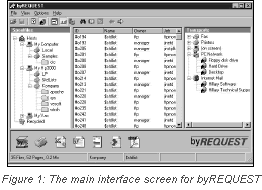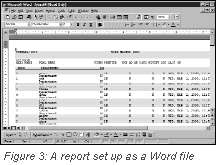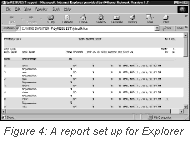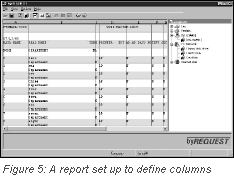|
Hillary has taken a different tack than competing software solutions
for report delivery, but I'll get to those details in a bit.
Essentially, byREQUEST will allow you to select and route spool files
based on various types of parameters for selection (all based on
objects available from LISTSPF). These reports can be sent by e-mail or
fax to a disk drive for later browsing (like a Web browser interface),
or to the screen. Your format can be text, HTML, Word, Excel or PDF.
There are other nifty features like electronic bursting and
collection of data, as well as columnizing a report to go to Excel. All
of which I will get to shortly.
How does it work?
Unlike every other product that I've seen in the genre,
byREQUEST doesn't have any 3000 host-based software: that is to say,
nothing runs on the HP 3000. This allows them to be multi-platform with
more ease than if they had to write servers for every system they work
with. Either by making use of Reflection as an OLE server for sending
commands to and from the HP, or by using a combination of FTP/Telnet,
byREQUEST will log on and issue various LISTSPF commands to parse and
qualify file names that have to be transferred and processed.
The download takes place via FTP or the WRQ file transfer
protocol, depending on what system you use. The nice part is that
byREQUEST seems to figure out what to use all on its own, you just need
to supply the IP address and logon information.
byREQUEST is written in Visual Basic, and as such is totally
resident on the Windows platform. I would be more inclined to use it as
a server and have it running somewhere on your NT server, processing
spool requests and routing the reports, as opposed to putting it on
users desktops.
byREQUEST has a built in viewer, but there really isn't any
reason to use it in a production environment. If you were to put this
on a users desktop you would expect data to be driven into it, and be
able to create folders to organize and store it. byREQUEST isn't put
together like that - it is more of a spool browser, and you can't
create any internal organizational scheme. It really makes more sense
to send it to e-mail, and use the foldering mechanism found in any
e-mail system to organize your reports. Features
 Figure 1 shows the main interface to byREQUEST. On the left pane are
sources of data. You can make these spool files, or flat files, and a
variety of platforms are supported. You will want to configure your own
spooler or a variety of spoolers that conform to the selection criteria
you are interested in. This gives you a way of breaking down what you
are looking at into logical groupings.
Figure 1 shows the main interface to byREQUEST. On the left pane are
sources of data. You can make these spool files, or flat files, and a
variety of platforms are supported. You will want to configure your own
spooler or a variety of spoolers that conform to the selection criteria
you are interested in. This gives you a way of breaking down what you
are looking at into logical groupings.
Within that spooler, byREQUEST will automatically create
folders for each account that spool files are in. Since the spooler I
set up was for MANAGER.SYS, I was seeing everything on my system.
 In
the center pane you will see a grid with spool files that match the
criteria for the selected spooler and folder. You can select any of
these reports and drag them to one of the icons below to view it in one
of the selected formats. The program will download the file, parse it,
format it for the destination viewer, and then launch the program.
Figures 2, 3 and 4 show the same report in Excel, Word, and Internet
Explorer. In
the center pane you will see a grid with spool files that match the
criteria for the selected spooler and folder. You can select any of
these reports and drag them to one of the icons below to view it in one
of the selected formats. The program will download the file, parse it,
format it for the destination viewer, and then launch the program.
Figures 2, 3 and 4 show the same report in Excel, Word, and Internet
Explorer.
What I found fascinating about the Excel export is what a
decent job byREQUEST did in trying to formatting the data correctly by
breaking it into columns. If you drop the report onto the little stack
of greenbar that sys "ByR", you will be presented with the spool
template setup screen seen in Figure 5.
 When
you're setting up the template parameters for a spool file, there are
just all sorts of really cool things you can define. If you look at
Figure 5, you will see where I have the report set up to define
columns-if this were something that you were going to send to Excel,
for example. You saw in Figure 2 what the default was for letting
byREQUEST figure out how to set columns. Honestly, it did a pretty darn
good job, especially considering that the report has two lines of data
per page. When
you're setting up the template parameters for a spool file, there are
just all sorts of really cool things you can define. If you look at
Figure 5, you will see where I have the report set up to define
columns-if this were something that you were going to send to Excel,
for example. You saw in Figure 2 what the default was for letting
byREQUEST figure out how to set columns. Honestly, it did a pretty darn
good job, especially considering that the report has two lines of data
per page.
 This
template setup section also allows you to apply Word or Excel macros to
the document after processing, which allows for even more options. One
of my favorite sections in here is setting up the automated bursting
parameters. Say you have a report that has logical breaks in it, like
Office Code or Salesman, but it's all part of one report and you have
the operators break it up and hand it out. Now byREQUEST can do this
for you. This
template setup section also allows you to apply Word or Excel macros to
the document after processing, which allows for even more options. One
of my favorite sections in here is setting up the automated bursting
parameters. Say you have a report that has logical breaks in it, like
Office Code or Salesman, but it's all part of one report and you have
the operators break it up and hand it out. Now byREQUEST can do this
for you.
 So
selecting, formatting and viewing are one piece of the puzzle. The
other piece is getting the reports where they can do some good. My
personal favorite is to e-mail them to someone as an attachment. You
could also send them as faxes, or you could select HTML and output them
to a directory on your Web server-so people could browse the file from
anywhere. There are options you can set up so that the name of the file
will hopefully be meaningful and people will know what to look for. So
selecting, formatting and viewing are one piece of the puzzle. The
other piece is getting the reports where they can do some good. My
personal favorite is to e-mail them to someone as an attachment. You
could also send them as faxes, or you could select HTML and output them
to a directory on your Web server-so people could browse the file from
anywhere. There are options you can set up so that the name of the file
will hopefully be meaningful and people will know what to look for. Installation and Documentation
The software only installs on your PC, so the standard Windows
installation process was followed, and it went flawlessly. The
documentation is electronic and very complete. I only browsed through
the doc to make sure it was there and covered the product, I really
didn't have any need to use the doc while I worked with the software.
The online help in byREQUEST is pretty darn cool. If you look at Figure
1 or 5, you will see a pane on the right, and this can be toggled to
have context sensitive help at any time being displayed. I really
enjoyed this feature of the product.
The TestDrive
Hillary likes to spend about 20 minutes with you on the phone
walking you through the product, and I found this to be a very helpful
thing. It shows some of the design philosophy and user interface items
quickly, and introduces you to a number of features that you may not
stumble across by randomly working with the product.
byREQUEST is very drag-n-drop oriented-you drag reports from
the grid to a viewer, you drag a transport onto a report. This is very
convenient and very intuitive.
The program crashed on me several times, and appeared to be
either leaking memory while it was running, or when it crashed it
filled up my memory. I found something still running after it crashed,
and I had to kill it with another tool, and then force the memory clear
with yet another tool so I could avoid rebooting. It just seemed like
the user interface was still a bit delicate. I was doing things like
trying to scroll side to side, or click on a column to see if it would
sort the data based on the column.
I had fun taking reports and dropping them into different
viewers and e-mailing them back to myself. I was really pleased with
how well all the conversion and transportation worked on the reports,
and this is the part that is going to be most important to people. You
probably aren't going to have people using the standard user interface
other than to set up the environment and do some testing. The interface
very nice, it's just a bit delicate, in my experience. Conclusions
As usual, I'll start with my nitpicks. I didn't care for the
fact that byREQUEST defaults to using MS Outlook and Reflection. There
was no way directly to make it "know" about Eudora or Netscape mail,
both of which are very popular (and what I use). There are some polish
issues as well: a simple example is that the icon in the task bar has a
nice name and icon, but if you use alt+tab to go between applications,
the icon is the default slanted page that is generated from Visual
Basic. Also, when you have a list a data that needs to scroll, and you
drag the slider to the right, the data doesn't actually scroll, but
jumps after you let go of the slider.
But those problems don't detract much from this fact: byREQUEST
is a totally awesome product. It's the wealth of distribution options
that make it so cool, as well as all of its native file format support.
It is really very simple to create a template that exports some
financial report into an Excel spreadsheet, for example. You don't have
to change the program, or write a new program, or retype the data. How
often have you been confronted with that task?
Electronic bursting is also a personal favorite. Now you can
have the software break apart and distribute your report for you.
Hillary really did a fantastic job of thinking about the issues of
paper delivery and solving virtually all of them. I was seriously
impressed with this product and will be personally recommending it to
clients. If you have the need, I would look at this product for sure.
|



